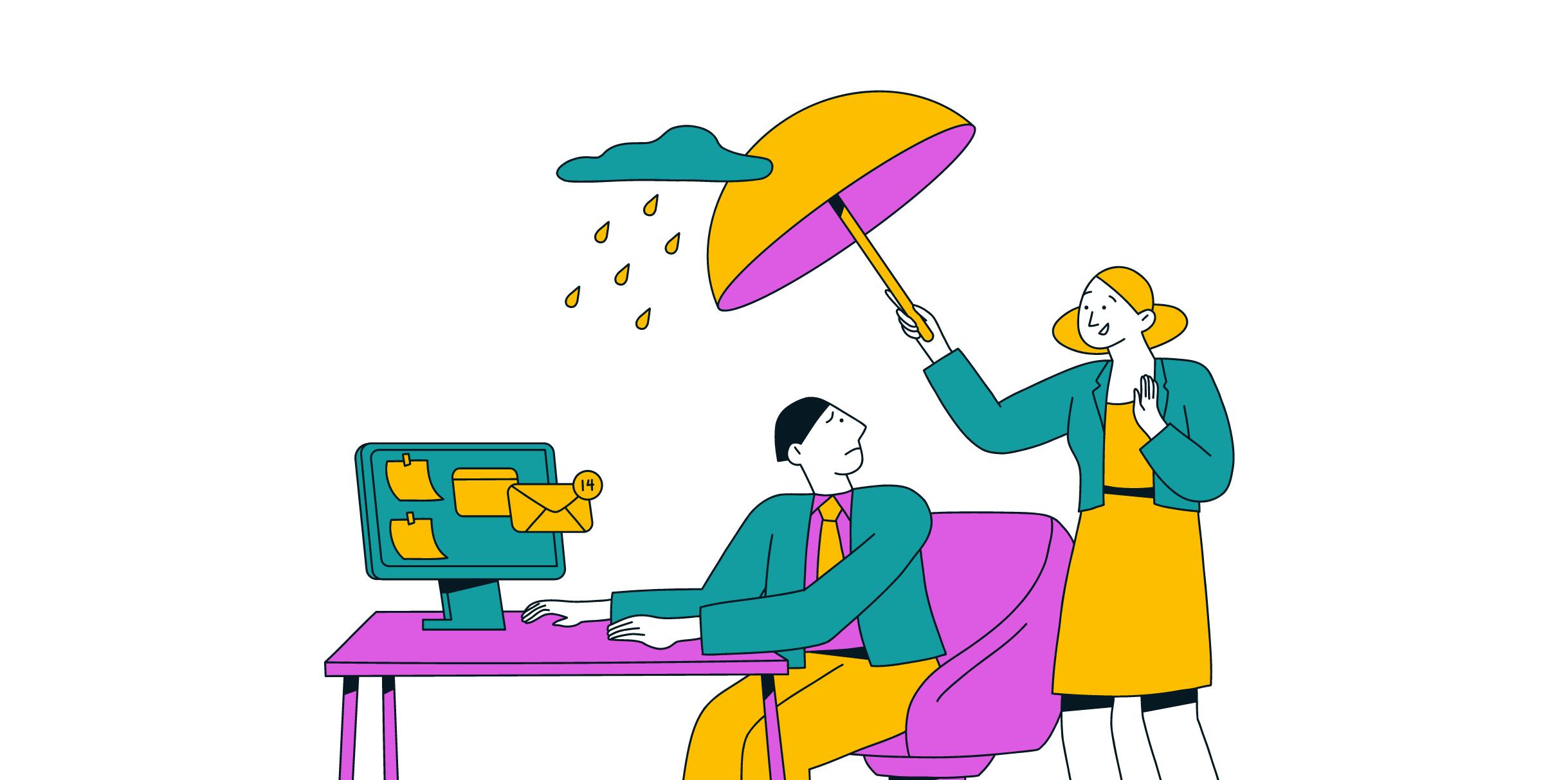Hello!
For many of us, a career seems like an endless marathon, and the concept of taking a break is often seen as a sign of weakness or indecision. By taking a closer look at the contemporary professional landscape, it becomes clear that linear and continuous career paths are more the exception than the rule. Platforms like LinkedIn provide us with a window into the realities of others' careers, showing us that breaks – those "gaps" many of us try to hide – are actually quite common. And yet, despite their frequency, there's a widespread reluctance to acknowledge and openly discuss them.
1. The reluctance to take a break. Where does it come from?
This reluctance largely stems from a deep desire to present ourselves in the best possible light. We worry about how recruiters and potential employers might interpret breaks in our career path. We fear they will be seen as a lack of ambition, determination, or worse, competence. But is this perception really justified?
It's time to reevaluate our concepts of career and success. Let's honestly ask ourselves if a non-stop approach, devoid of moments for reflection or realignment, truly serves our ultimate well-being. The truth is, career breaks are not only inevitable for many of us but can also be profoundly beneficial. They provide essential opportunities for rest, personal and professional development, and, not least, for a necessary reassessment of what we truly want from our professional lives.
Therefore, this article aims to explore the benefits of breaks and offer practical advice on how to manage and present them in an authentic and advantageous way on your resume. Let's embrace breaks not as gaps in our career path but as valuable stages of growth and development.
2. The Importance of accepting career breaks
a. The myth of perfect continuity in resumes and the reality of professional breaks
We are encouraged to constantly propel ourselves toward new goals, achieve high performances, and push our limits. However, in this endless pursuit of success, it's easy to lose ourselves in our aspirations, forgetting to listen to our body and mind, which sometimes scream for a break. Whether due to extreme fatigue, a feeling of stagnation, facing emotional or social challenges, or simply a desire to explore new professional horizons, the reasons for taking a career break are varied and deeply human.
b. The need for a career break
Unlike regular vacations or quick job changes, a career break is a conscious decision to take a significant step back from professional life. It offers not just time for rest and recovery but also the opportunity to reflect on the direction we truly want to pursue in life and work. A well-planned break can serve as a vital reset point, allowing us to recharge our batteries and return to the workforce with renewed energy and a fresh perspective.
In this context, it's essential to recognize that taking a break is not a sign of weakness, but a demonstration of strength and self-awareness. It's an act of courage to acknowledge that we are human and that sometimes, the most productive thing we can do is to stop, breathe, and realign with ourselves and our aspirations.
3. Planning the break

a. Recognizing the need for a break and the joy of rediscovery Once you've acknowledged the need for a break, the next step is to determine its duration. Whether it's a few months or even a year, it's crucial to consider your personal needs, both emotionally and financially. Planning activities during the break is also important. This can include travel, hobbies, volunteering, or anything that helps you reconnect with yourself and recharge with positive energy.
b. Setting the duration and planning Planning a career break involves assessing your social, financial, and emotional needs. It's crucial to establish a realistic duration and plan activities that support your personal and professional goals. Lastly, staying connected to the professional world can facilitate the transition back to work. Participating in courses, workshops, or events in your field of interest can help you stay updated with industry trends and changes, making your return to the workforce easier.
c. Recommended activities during the break A career break offers the chance to explore new interests, travel, volunteer, or take professional development courses. These activities not only improve well-being but can also add value to your resume. Now you have time to do what you've wanted but couldn't fit into your schedule!
4. Benefits of a career break
a. Improving health and mental clarity
The benefits of a deliberate career break can be multiple and significant. At first glance, taking a break might seem like a luxury or a necessity dictated only by extraordinary circumstances. However, the profound benefits of such a decision can positively influence not just personal well-being but also subsequent professional performance.
A career break offers a unique opportunity to improve physical and mental health. The constant stress and demands of work can negatively impact our health, making us forget the importance of rest and recovery. A break allows us to reconnect with our basic needs, rest, and rejuvenate, ultimately leading to improved productivity and creativity when we return to work. It's an investment in our health that can pay dividends in our future professional endeavors.
b. Gaining new perspectives and skills
Beyond the immediate benefits of rest and recovery, a career break can also be a period of significant personal growth and skill development. Exploring new interests, learning new skills, and even traveling to new places can provide fresh perspectives that enrich our professional lives. This period of exploration can lead to a clearer understanding of what we want from our careers and how to achieve it.
c. Enhancing professional value
Interestingly, a career break can also enhance your professional value. Employers increasingly recognize the benefits of a diverse set of experiences and skills. The insights gained from time spent volunteering, studying, or working in a new field can make you a more adaptable, creative, and resilient employee. Moreover, the ability to explain how your break has contributed to your personal and professional development can set you apart in the job market.
5. Financial planning for a career break

Financial planning is vital to ensure that your career break is as peaceful as possible. An essential aspect is to start saving early, dedicating a percentage of your monthly income to this period. This savings fund will be the backbone of your financial security during the break.
In addition to saving, it is important to develop a detailed budget that covers all essential expenses. This step helps you assess how long you can afford to stay away from the job market without taking major financial risks. By managing your finances wisely, you will be able to enjoy your career break without additional worries.
6. Challenges of returning to the workforce
Specific difficulties and the impact of the "Motherhood Penalty"
Returning to the workforce after a break can be challenging, especially for women, who often face additional obstacles, such as the career impact of maternity leave, known as the "motherhood penalty". This phenomenon can affect employment opportunities and salary levels, adding extra pressure on the job search process.
A survey conducted on the LinkedIn platform showed that about 67% of respondents believe that career breaks negatively affected their chances of finding a new job. This underscores the importance of thorough preparation for the re-entry process into the job market and adopting effective strategies to overcome potential biases.
7. Strategies for facilitating the transition
a. Updating the CV
It is crucial to have an updated CV that reflects not just your previous experience, but also any new skills or knowledge gained during the break. This can include online courses, volunteering, or personal projects that demonstrate initiative and a desire for continuous learning.
b. Diversifying application methods
Do not limit yourself to applying online through traditional job portals. Exploring personal networks, recommendations from former colleagues, or participating in networking events can open new and unexpected doors.
c. Staying up-to-date with your industry
A career break does not mean a break in education. Be proactive in following the latest trends and changes in your field, participating in seminars, webinars, or courses that can enrich your knowledge and increase your competitiveness in the job market.
By adopting these strategies, you will position yourself as a valuable and adaptable candidate, ready for the challenges and opportunities that await you in the next stage of your career.
8. How to present a career break on your resume
Presenting career breaks in your resume may seem challenging, but when approached correctly, they can highlight your flexibility and adaptability. Here are some basic principles to effectively structure your response:
a. Structuring the response
Begin by clarifying the reason for your career break, whether it be for personal development, health issues, travel, or professional reorientation. Then, demonstrate how you used this time productively, such as by acquiring new skills or exploring new interests. Finally, connect this experience to the role you're applying for, showing how the break has prepared or enriched you for future challenges.
b. Highlighting productive activities
Even if you were away from a traditional work environment, any activity that contributed to your personal or professional development is worth mentioning. This shows that you were engaged in growth and learning, even outside the usual professional context.
c. Positivity and honesty
Maintain a positive and honest tone when discussing career breaks. It's not necessary to go into deep personal details, but it is important to be open and honest about how you used this time for development.
By addressing career breaks in your resume with honesty and confidence, you will be able to turn potential question marks into evidence of your adaptability and resilience. This is an opportunity to show your capacity for continuous development, even in the face of changes.
In conclusion
Career breaks are not signs of failure but opportunities for growth and reflection. They offer the chance to reconnect with oneself, acquire new skills, and reevaluate professional goals. Instead of hiding them, we should present them in our resumes with pride, as valuable periods that have helped us evolve.
Recruiters appreciate authentic and adaptable candidates, and a well-explained career break can highlight your ability to adapt and your desire for self-improvement. Therefore, embrace your breaks as essential chapters in your professional story, which set you apart and enhance your value in the job market.
Our friends from CNBC have a great article about owning your resume gaps!
If you decide that a career break is what you need, we wholeheartedly wish you success!
With love,
Growee Team

